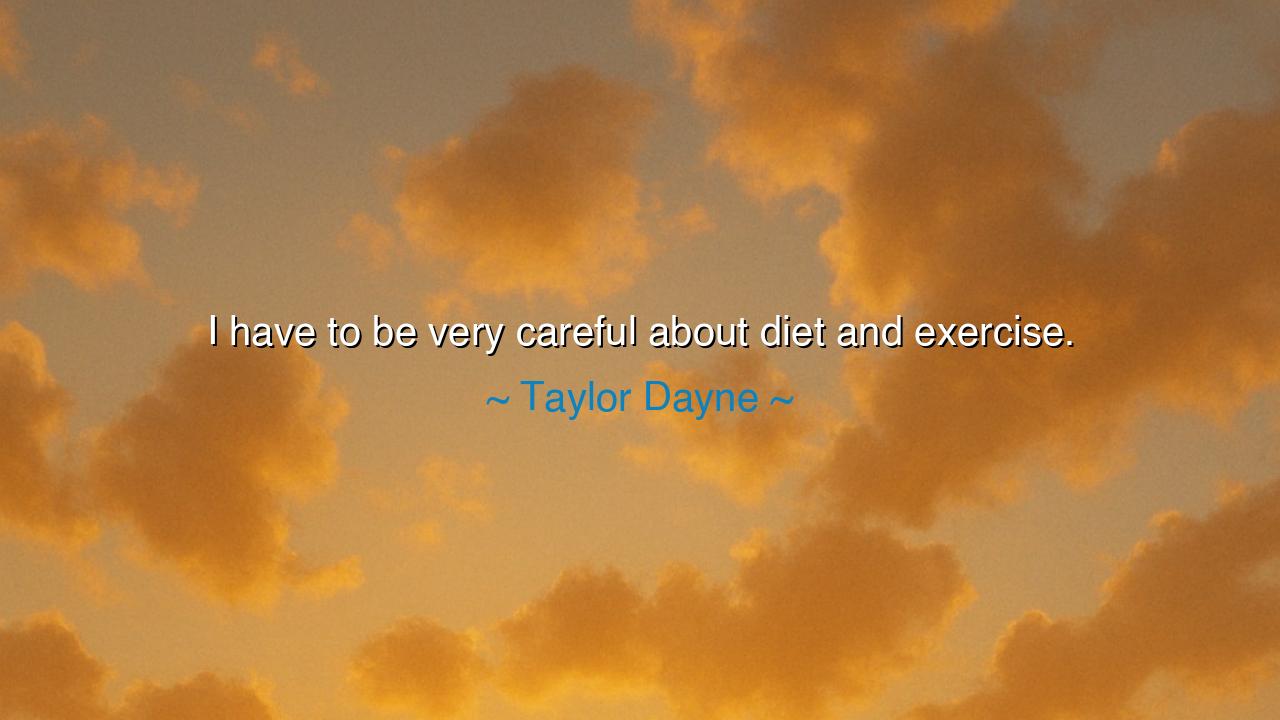
I have to be very careful about diet and exercise.






In the words of Taylor Dayne, “I have to be very careful about diet and exercise,” there echoes an ancient truth older than any kingdom or creed—the truth that the body is the vessel of the spirit, and to guard it is an act of reverence. These words are not born of vanity, but of vigilance; they speak of a sacred duty that each soul must bear, to honor the temple in which life itself resides. To be careful, as she declares, is not to live in fear, but to live in awareness—to tread the narrow path between indulgence and neglect, where health and harmony dwell together.
The ancients taught that discipline is not a chain, but a form of freedom. For the one who governs their body with wisdom is master not only of flesh, but of fate. In the old cities of Greece, athletes rose with the dawn, their breath like fire in the cool morning air. They trained not for vanity, but for virtue—for they knew that strength of limb was the sister of strength of heart. To be “careful about diet and exercise” was, in their eyes, to cultivate excellence, to prepare the soul for both battle and peace. So too, Taylor Dayne’s words are a song of vigilance, a reminder that greatness requires guardianship.
Consider the tale of Hippocrates, the father of medicine, who once declared, “Let food be thy medicine and medicine be thy food.” He understood that the harmony of the body is the foundation of wisdom itself. When the balance of nourishment and movement is disturbed, even the brightest mind falters, and the strongest will grows dim. The wise physician did not chase indulgence nor deny pleasure—he walked the path of awareness, where each meal was a choice, and each movement an offering to the divine order of life.
There was also the Emperor Marcus Aurelius, who ruled an empire yet lived with the restraint of a monk. He knew that power and pleasure are fleeting, but self-command endures beyond death. He wrote in his Meditations, “It is not death that a man should fear, but he should fear never beginning to live.” To live, truly live, one must guard their energy, their mind, their form. And thus, to be careful about diet and exercise is to honor the life-force that makes all other endeavors possible. For how can one pursue truth, beauty, or love if the body that carries them is broken by neglect?
Beware the folly of extremes. The glutton who feasts without thought and the ascetic who starves himself both wander astray from the golden road of balance. Nature herself teaches moderation: the ocean ebbs and flows, the sun rises and sets, and even the mighty heart must rest between beats. Carefulness is not weakness—it is the mark of those who understand that strength is sustained not by bursts of passion, but by constancy. Each choice—each morsel of food, each step of exertion—builds or breaks the temple we inhabit.
The meaning of Dayne’s words reaches beyond the realm of diet and movement; it is the language of stewardship, of devotion to self as a vessel of purpose. She reminds us that care is not selfish—it is sacred. In every age, the careless fall to ruin, but the mindful endure. The warrior who sharpens his sword and the singer who preserves her voice both serve their calling through discipline, not desire. So too must we tend to our bodies if we wish our spirits to sing.
Let this be the lesson passed down: Treat your body as a gift entrusted to your keeping. Eat with mindfulness, not for escape but for strength. Move with intention, not to boast but to breathe more deeply of life’s fullness. Rise early and greet the day with gratitude; rest before exhaustion turns your light to ash. Balance pleasure with purpose, indulgence with restraint. For when the body is strong and the spirit calm, the world itself becomes clearer, and every act—no matter how small—becomes a reflection of harmony.
Thus, let the wise remember: to be careful is not to fear living—it is to choose life deliberately, every day, with reverence and resolve. In that sacred care lies the key to enduring vitality, to courage, to joy. And as the ancients knew, those who master themselves need bow before no other power under the sun.






AAdministratorAdministrator
Welcome, honored guests. Please leave a comment, we will respond soon